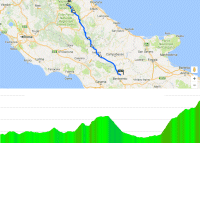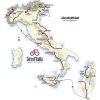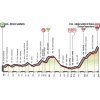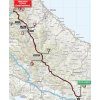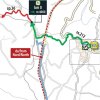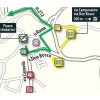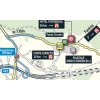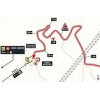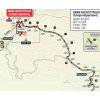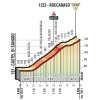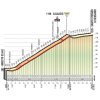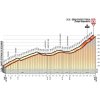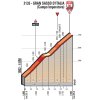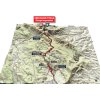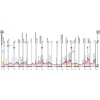It’s been a while but the 2018 Giro d’Italia will be visiting the Gran Sasso again after a long hiatus. In the past, first riders at the massif in Abruzzo were Marco Pantani (1999), John Carlsen (1989), Franco Chioccioli (1985) and Vicente López Carril (1971).
The full name of the mountain range is Gran Sasso d’Italia, which is appropriate as it means Great Stone of Italy. The Gran Sasso is dominated by three peaks: Corno Grande, Corno Piccolo and Pizzo Intermesoli. At 2,912 metres, Corno Grande is the highest peak in the Apennines.
Gran Sasso may have been a stage finish four times, this year’s climb is new except for the last 6 kilometres. And in 1985 the finish line was located almost 1,000 metres lower, in Fonte Cerreto.
But before hitting the giant of the Appenines the riders face an upward rolling section of 100 kilometres to the base of the first climb, which runs to Roccaraso. The ascent is 8.9 kilometres at 6.2% with steepest ramps of 12%. Two editions ago the 6th stage of the Giro finished at the ski area of Roccaraso – 6 kilometres higher up the mountain – and Tim Wellens took the win.
Following the passage in Roccaraso the route continues on the flat for 10 kilometres before a long stretched descent runs to the foot of the ascent to Calascio. At 13.7 kilometres this climb is averaging 6%. The almost abandoned village is dominated by Rocca Calascio, an impressive mountaintop fortress at 1,460 metres.
Arguably, the last climb begins at the foot of the Calascio climb, with 47 kilometres remaining. After moving through the village the route remains on the flat for 5.6 kilometres and then it goes back up again. By now, the riders are on the final ascent to the Campo Imperatore (“Emperor’s Field”) of the Gran Sasso. This is the largest plateau of the Apennine ridge.
The actual last climb of the 9th stage opens with 10 kilometres at 4% before a rolling false flat of 9 kilometres followed by 3 kilometres at 4.1%. Then the Gran Sasso starts to show its teeth. The last 4.45 kilometres to the Campo Imperatore are marked by a 8,2%, while the steepest ramp of 13% is 1.5 kilometres before the line.
The finish is at an altitude of 2,135 metres, which is almost enough for the Cima Coppi, the highest peak of the Giro d’Italia. But, not quite. The Finestre is crested in stage 19 and peaks at 2,178 metres.
The first three riders on the line take time bonuses of 10, 6 and 4 seconds, while the last of two intermediate sprints (at kilometre 161.2 and at kilometre 167.6) comes with 3, 2 and 1 seconds.
Read also: results/race report 9th stage 2018 Giro d’Italia.
Giro d’Italia 2018 stage 9: Route maps, height profiles, and more
Click on the images to zoom
